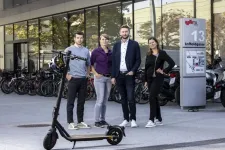(Press-News.org) The use of e-scooters has increased significantly in recent years, but so has the number of accidents involving this relatively new form of transport. At the same time, knowledge about injury mechanisms in this area was still very limited. In the project SURF, funded by Zukunftsfonds Steiermark, the Vehicle Safety Institute at Graz University of Technology (TU Graz) investigated this topic using Human Body Models and derived recommendations to reduce the injury risk in e-scooter accidents.
Put on a helmet, decrease speed and get off the pavement
As is also the case for other groups of vulnerable road users, the study found that when riding an e-scooter, a helmet can reduce the risk of head injuries drastically – in this case by up to 44 percent. It also showed that a ban on e-scooters on pavements and footpaths makes sense. The simulations showed that collisions with pedestrians often result in serious injuries. In addition to the ban, a speed limit would bring more safety in this regard – the same applies to single e-scooter accidents. For example, the risk of head injuries to pedestrians is reduced by up to 49 percent when the collision speed is reduced from 25 km/h to 15 km/h. In contrast, in collisions with passenger cars, it is mainly the speed of the car that plays a major role in the level of injury risk. Collisions with cars travelling at 40 km/h can cause severe to fatal head injuries to e-scooter riders.
A reduction in the maximum permitted speed of e-scooters would also benefit unexperienced drivers. As part of the study, there were experiments with volunteers in which the driving behaviour of the e-scooter riders was examined in order to determine their riding pose for simulations with Human Body Models. This showed that even unexperienced drivers often rode at the top speed of their e-scooters, although they were still very unsafe on the road.
From literature analysis to simulation
In order to obtain realistic results for the study, the team led by project manager Christoph Leo, research group leader Corina Klug, project assistant Desiree Kofler and university assistant Martin Schachner first analysed the accident events on the basis of literature, accident records and videos in order to derive boundary conditions for the simulation. Subsequently, the tests with volunteers to determine the riding pose were combined with Human Body Model simulations, which were developed with the involvement of the Vehicle Safety Institute, in order to be able to predict injuries in accidents. From this, a simulation matrix could be created that made it possible to answer the project questions.
“Because e-scooters are a very young form of mobility, we broke new ground in this project in order to be able to analyse the injury risk in e-scooter accidents. There were previously not many studies on this,” explains Christoph Leo. “However, after analysing the simulated accidents with the Human Body Models, a very clear picture emerged. Wearing a helmet and reducing the driving speed, especially around pedestrians, can prevent many serious injuries. It would be even more important that e-scooters comply with the ban on driving on pavements and footpaths. In general, the risks of this form of mobility seem to be underestimated, which is why an increasing number of injuries is expected in the coming years. You are safer in road traffic on foot or by bike and simultaneously do something good for yourself and the environment. Anyone who really needs to ride an e-scooter, please at least put on a helmet.”
This research is anchored in the Field of Expertise "Mobility & Production", one of five strategic foci of TU Graz.
END
Graz University of Technology study on e-scooter accidents: more helmets and less speed reduce the injury risk
A team from the Vehicle Safety Institute at TU Graz has used Human Body Models to investigate accidents involving electric scooters and identified the most important factors for preventing serious injuries
2023-10-18
ELSE PRESS RELEASES FROM THIS DATE:
Reef-devouring predator survives coral bleaching and feasts on the survivors
2023-10-18
Research conducted by marine biologists from the University of Sydney has found juvenile crown-of-thorns starfish can withstand tremendous heatwaves well above levels that kill coral. These starfish then develop into carnivorous predators that devour reefs just as they begin to regrow.
Crown-of-thorns starfish are native to the Great Barrier Reef and found in the Indo-Pacific region, but they are classified as a species of concern because the damage large populations cause to coral is more significant than any other species. ...
Does SARS-CoV-2 infection have urological effects?
2023-10-18
Research published in the Journal of Internal Medicine indicates that SARS-CoV-2 infection may worsen lower urinary tract symptoms (LUTS) in men.
The study included 17,986 men receiving medication for LUTS within the public healthcare system of Hong Kong in 2021–2022, half of whom had SARS-CoV-2 infection. The group with SARS-CoV-2 had significantly higher rates of retention of urine (4.55% versus 0.86%); blood in the urine (1.36% versus 0.41%); clinical urinary tract infection (4.31% versus 1.49%); bacteria in the urine (9.02% versus 1.97%); and addition of 5-alpha reductase inhibitors, which are drugs prescribed for enlarged prostate. (0.50% versus 0.02%). These urological ...
How did the initial COVID-19 wave affect mental health in the UK?
2023-10-18
New research published in Economic Inquiry reports substantial increases in psychological distress in the UK during the first wave of the COVID-19 pandemic.
Mental health effects were more pronounced for females; younger individuals; Black, Asian, and minority ethnic communities; and migrants. Also, people who had financial worries, loneliness, or were living in overcrowded dwellings experienced significantly worse mental health deterioration during the first wave.
The study used data from the UKHLS, also known as Understanding Society, which is a household panel dataset that captures, among other things, information from adults about their economic and social circumstances, ...
Heat-tolerant predatory sea stars will likely be a threat to coral during climate change
2023-10-18
Population outbreaks of the crown-of-thorns sea star (COTS), a predator of coral, can cause widespread coral mortality. COTS are herbivorous as juveniles but then switch to coral consumption as they grow to adulthood. When researchers exposed juvenile COTS to heat stress scenarios at time and temperature durations designed to reflect conditions that cause coral bleaching and mortality, juveniles exhibited tolerance to heatwave conditions well above levels that kill coral.
The findings, which are published in Global Change Biology, indicate that juvenile COTS are likely to persist as major coral predators in reefs already vulnerable to the effects of climate change.
“This ...
Does COVID-19 affect Alzheimer’s disease risk?
2023-10-18
The various neurological symptoms that patients with COVID-19 have experienced suggest that viral infections may increase the risk of neurodegeneration, which could in turn contribute to the development of conditions such as Alzheimer’s disease (AD). A review in the Journal of Neurochemistry highlights the potential mechanistic links between COVID-19 and AD.
The authors note that age is the largest contributing factor to AD and COVID-19, and both appear to enhance the effects of the other, with potentially synergistic effects on neurodegeneration.
“I believe over the next several ...
Can planting multiple crops in the same plot improve agricultural production and sustainability?
2023-10-18
Agricultural management has typically focused on increasing yields, but there is an increasing need for sustainable food production that limits negative impacts on the environment. A new study published in Grassland Research provides insights into the potential benefits of diversifying agricultural practices, revealing how different mixtures of plant species can improve production, quality, and conservation.
For the study, investigators planted multiple species in different grassland plots, manipulating plant species richness from one to six species spanning three functional groups ...
New method may accurately identify body fluids at crime scenes
2023-10-18
Identifying different types of body fluids can help forensic experts reconstruct a crime scene, but it’s difficult to do so. In a study published in Electrophoresis, researchers developed a method using two different types of RNA—called microRNA (miRNA) and messenger RNA (mRNA)—to determine five common body fluids.
Compared with previously reported single mRNA or miRNA assays, the combination of several mRNAs and miRNAs showed significant advantages for labeling human body fluids.
“Our findings indicate that this combined mRNA and miRNA system may provide a scientific ...
You don’t lose if you snooze
2023-10-18
It is often claimed that using the snooze button can have negative effects on sleep and cognitive processes, but there has been no direct evidence to this effect. New research from the Department of Psychology at Stockholm University shows that snoozing may actually support the waking process for regular snoozers.
It's common to want to stay in bed, potentially even go back to sleep, when the alarm goes off in the morning. The snooze button has been a function in alarm clocks and cell phones for decades and is ...
Do humans get lazier when robots help with tasks?
2023-10-18
Now that improvements in technology mean that some robots work alongside humans, there is evidence that those humans have learned to see them as team-mates — and teamwork can have negative as well as positive effects on people’s performance. People sometimes relax, letting their colleagues do the work instead. This is called ‘social loafing’, and it’s common where people know their contribution won’t be noticed or they’ve acclimatized to another team member’s high performance. Scientists at the Technical University of Berlin investigated whether humans social loaf when they work with robots.
“Teamwork ...
Using AI to develop hydrogen fuel cell catalysts more efficiently and economically
2023-10-18
Proton exchange membrane hydrogen fuel cells (PEMFCs) used in hydrogen vehicles use expensive platinum catalysts to facilitate the oxygen reduction reaction at the anode. There are a vast number of elemental combinations and compositions that need to be explored to develop more efficient and cost-effective catalyst materials than platinum, and researchers are still doing a lot of trial and error in the lab.
The Korea Institute of Science and Technology (KIST, President Seok Jin Yoon) announced that Dr. Donghun ...
LAST 30 PRESS RELEASES:
Scientists discover why we know when to stop scratching an itch
A hidden reason inner ear cells die – and what it means for preventing hearing loss
Researchers discover how tuberculosis bacteria use a “stealth” mechanism to evade the immune system
New microscopy technique lets scientists see cells in unprecedented detail and color
Sometimes less is more: Scientists rethink how to pack medicine into tiny delivery capsules
Scientists build low-cost microscope to study living cells in zero gravity
The Biophysical Journal names Denis V. Titov the 2025 Paper of the Year-Early Career Investigator awardee
Scientists show how your body senses cold—and why menthol feels cool
Scientists deliver new molecule for getting DNA into cells
Study reveals insights about brain regions linked to OCD, informing potential treatments
Does ocean saltiness influence El Niño?
2026 Young Investigators: ONR celebrates new talent tackling warfighter challenges
Genetics help explain who gets the ‘telltale tingle’ from music, art and literature
Many Americans misunderstand medical aid in dying laws
Researchers publish landmark infectious disease study in ‘Science’
New NSF award supports innovative role-playing game approach to strengthening research security in academia
Kumar named to ACMA Emerging Leaders Program for 2026
AI language models could transform aquatic environmental risk assessment
New isotope tools reveal hidden pathways reshaping the global nitrogen cycle
Study reveals how antibiotic structure controls removal from water using biochar
Why chronic pain lasts longer in women: Immune cells offer clues
Toxic exposure creates epigenetic disease risk over 20 generations
More time spent on social media linked to steroid use intentions among boys and men
New study suggests a “kick it while it’s down” approach to cancer treatment could improve cure rates
Milken Institute, Ann Theodore Foundation launch new grant to support clinical trial for potential sarcoidosis treatment
New strategies boost effectiveness of CAR-NK therapy against cancer
Study: Adolescent cannabis use linked to doubling risk of psychotic and bipolar disorders
Invisible harms: drug-related deaths spike after hurricanes and tropical storms
Adolescent cannabis use and risk of psychotic, bipolar, depressive, and anxiety disorders
Anxiety, depression, and care barriers in adults with intellectual and developmental disabilities
[Press-News.org] Graz University of Technology study on e-scooter accidents: more helmets and less speed reduce the injury riskA team from the Vehicle Safety Institute at TU Graz has used Human Body Models to investigate accidents involving electric scooters and identified the most important factors for preventing serious injuries





